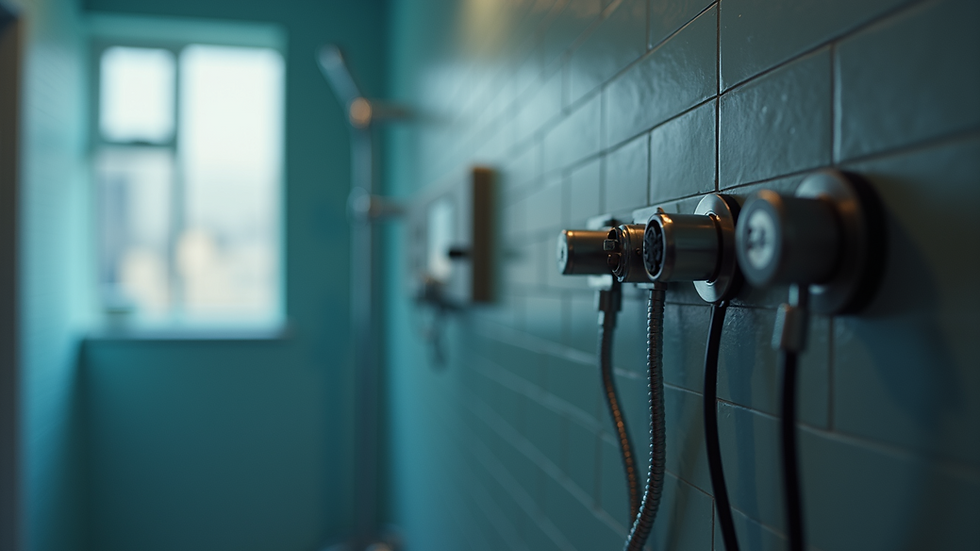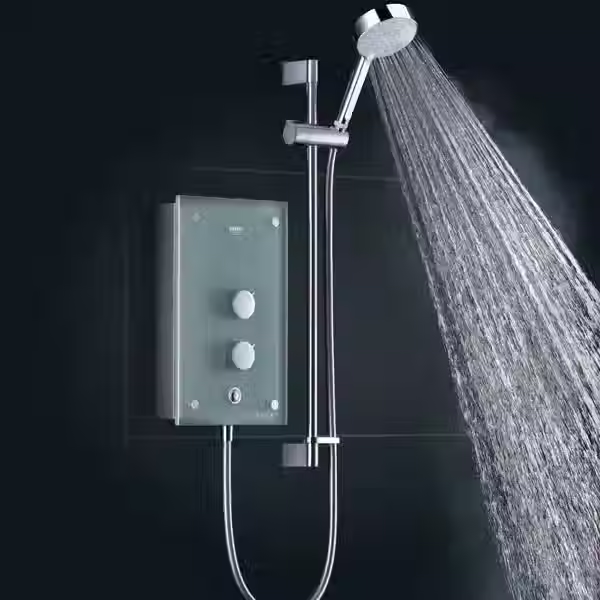Exploring the Unsung Heroes of Electric Showers: The Role of Correctly rated Cables and MCBs
- Paul Wild
- Jun 24, 2025
- 4 min read
Electric showers have become indispensable in modern bathrooms, offering comfort at the mere touch of a button. Yet, behind their attractive designs and user-friendly interfaces are crucial components that often go unnoticed: underrated cables and miniature circuit breakers (MCBs). By understanding the essential roles of these elements, homeowners can maintain a safe and efficient shower experience.
This article highlights the importance of correctly rated cables and MCBs in electric showers and emphasizes their contribution to overall safety and functionality.
Essential Electrical Components in Electric Showers
When considering the installation of electric showers, many focus on the design and water flow. However, the electrical system powering these showers is just as vital, if not more. Electric showers typically require substantial current, with some high-power models demanding up to 40 amps. If the wiring is inadequate or the components like cables and MCBs are underrated, serious issues can arise, such as overheating, tripped circuits, or even electrical fires.
Thus, it's crucial to grasp the specific electrical requirements of an electric shower and choose the right cables and MCBs accordingly.
Clarifying Rated and Underrated Cables
Cables are essential for the operation of electric showers, carrying electricity from the supply panel to the shower unit. Rated cables are designed to handle the necessary current for specific applications, whereas underrated cables don't meet these requirements.
Employing underrated cables might initially appear to save money, but this decision can lead to unsafe conditions and higher costs down the line.
The Hazards of Using Underrated Cables
Using inadequate cables can create several risks:
Overheating: Cables not designed for the electrical load can overheat, presenting a fire risk. For instance, a 10mm² cable is recommended for electric showers drawing high currents.
Voltage drop: If the cable is undersized, it can cause voltage drops, which results in poor shower performance. Research shows that a drop of over 5% can lead to noticeable reductions in appliance efficiency.
Short circuits: Poor quality or incorrectly sized cables can increase the likelihood of short circuits, which may cause severe hazards.
It is critical to refer to your shower’s manufacturer guidelines and relevant safety standards when selecting the right grade of cables.
The Function of Miniature Circuit Breakers (MCBs)
Along with cables, MCBs are vital components that deserve attention. An MCB is an automatic switch that safeguards electrical circuits from overload and short circuits. These devices act quickly to cut off electricity when they detect a fault, protecting your shower and the home’s wiring from damage.
Choosing the Right MCB for Electric Showers
Selecting the appropriate MCB requires careful consideration of its current rating and type.
Current rating: It’s crucial to choose an MCB that aligns with the electric shower's load requirements. For example, if a shower requires 30A, using a 20A MCB may not offer adequate protection.
Type B: Ideal for residential use, where typical overloading occurs.
Type C: Suited for inductive loads, making them ideal for commercial applications.
Type of MCB: Different types of MCBs are appropriate for various scenarios:
The Dangers of Underrated MCBs
Similar to cables, using underrated MCBs can cause serious safety issues. If an MCB trips often, it frustrates users and disrupts their shower experience. Conversely, if an MCB fails to trip when necessary, it can damage equipment or pose serious risks to life.
Best Practices for Installation
To ensure safe and efficient integration of cables and MCBs in electric showers, follow these best practices:
Professional Installation: Always enlist professional help or consult experts when installing electric showers. They ensure that installations comply with regulatory standards.
Regular Maintenance: Schedule maintenance checks for your electric shower's components to maintain safety and efficiency.
Correct Sizing: Understand the specific requirements of your electric shower and ensure both cables and MCBs are properly sized.

Frequently Asked Questions About Electric Showers, Cables, and MCBs
What gauge cable is recommended for electric showers?
Typically, a 10mm² cable is recommended for high-powered electric showers. This may vary based on the specific requirements of your unit and the distance from the consumer unit.
Can I use standard cables for electric showers?
No, it is essential to use cables that are specifically rated for high-power applications like electric showers. Standard cables won't reliably handle the electrical load.
How often should I replace MCBs?
MCBs are designed to last, but it is wise to replace them every 10 to 15 years or if they trip frequently, as this indicates potential issues.
Final Thoughts
In closing, correctly rated cables and MCBs are essential for the safe and efficient operation of electric showers. These often-overlooked components are key to ensuring smooth electrical flow and preventing dangerous incidents.
As we appreciate the comfort of electric showers, it’s crucial to recognize these unsung heroes that make them work. Prioritizing the right components and installation methods not only enhances the showering experience but also keeps your family safe.

By understanding these essentials, homeowners can enjoy their electric showers with confidence. Investing in quality cables and MCBs is not merely an expense; it is a commitment to safety and performance that can significantly improve your everyday life.


Comments